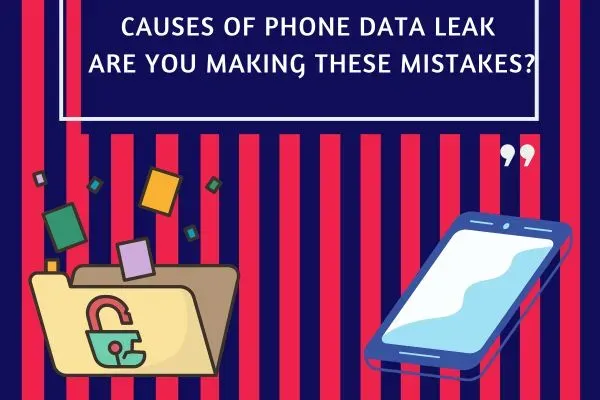Security tips : Causes of Phone Data Leak, Are You Making These Mistakes?
Every day, we hear news of data leaks. Nowadays, data leaks are happening in various ways. Sometimes Facebook data is leaking, and sometimes data from a shopping site is leaking.
Not only that, even your smartphone's private data like photos, videos, or confidential files can also leak.
After a data leak, your private information such as email IDs, passwords, mobile numbers, etc., falls into the hands of hackers, after which the sale of data takes place on hacker forums like the dark web, or it can even be used for personal blackmail.
If you are using an Android smartphone, you should keep in mind some essential things to keep your data secure so that you can protect yourself from any unpleasant incidents in the future. Let's find out.
Causes of Data Leak Before prevention, let's try to understand the reasons behind your private data leak. It is often observed that we share our private photos, videos, files, and passwords with friends and relatives. What if they transfer your data to someone else? In such cases, your data can leak.
Moreover, many times, in a hurry or without paying attention, we install third-party apps without authentic sources. These apps can be loaded with spyware and can expose your private information to hackers.
Ways to Avoid Data Leak:
The easiest and most essential way to prevent your smartphone's data leak is to lock your phone. Also, secure apps like the gallery and file manager with app locks. Nowadays, smartphone companies have also started providing the pre-install app lock feature for security reasons.
You can use this feature to lock your mobile apps securely.
Do not share your private data with anyone, be it on social media platforms like WhatsApp, Facebook Messenger, or Instagram.
Avoid downloading and installing any app from unofficial sources. You should only install apps from the Google Play Store, instead of installing it from other websites.
Also, don't forget to read the app's ratings and reviews before installing it.
Avoid using third-party apps. Sometimes, these apps contain spyware and malware that scan your phone and send your private information to hackers.
Try to install only necessary apps on your phone, and if you have any doubts, remove the app immediately.
You should never click on any unknown links from your mobile phone. Hackers or scammers often send links filled with malware through email or SMS. Clicking on such links can initiate spying on your phone.
Frequently Asked Questions (FAQ) :
1.What is a data leak, and why is it a concern for smartphone users?
A data leak refers to the unauthorized disclosure or exposure of sensitive or personal information. Smartphone users are concerned about data leaks because they can result in the compromise of personal data, such as photos, videos, passwords, and contact information, leading to privacy and security risks.
2.How can I protect my smartphone from data leaks when sharing files with friends and family?
To protect your smartphone, avoid sharing sensitive files directly with others. Instead, use secure sharing methods, like encrypted messaging apps or file-sharing services, and be cautious about who you share with. Additionally, consider setting up authentication methods or app locks on your device to add an extra layer of security.
3.What are third-party apps, and why should I be cautious about installing them on my smartphone?
Third-party apps are applications that are not available on official app stores like Google Play Store or Apple App Store. Users should exercise caution when installing them because these apps may not undergo the same security checks and monitoring as official apps, making them more susceptible to containing malware or spyware that can lead to data leaks.
4.What should I do if I suspect my smartphone has been compromised or my data has been leaked?
If you suspect a data leak or compromise, take immediate action. Disconnect your device from the internet, change your passwords (especially for sensitive accounts), run a security scan, and uninstall any suspicious apps. Consider contacting your smartphone manufacturer's support or a cybersecurity professional for further assistance.
5.How can I recognize and avoid phishing attempts through email or SMS to prevent data leaks?
Be cautious when receiving unsolicited emails or SMS messages containing links. Avoid clicking on links from unknown sources, especially if they ask for personal information or login credentials. Instead, verify the sender's identity and use official websites or apps to access your accounts. Consider using email or SMS filtering tools to block potential phishing attempts


Post a Comment
Please do fair and genuine comment only